
 18 minutes read
18 minutes read
Let's be honest. Hunting for legal internships in DC feels less like a job search and more like trying to get a table at a restaurant that only takes reservations by carrier pigeon. You're up against thousands of other ambitious law students, all trying to squeeze into the same handful of spots at the DOJ, a high-impact nonprofit, or a coveted judicial clerkship.
Hope you enjoy spending your afternoons fact-checking your own resume and running mock interviews in the mirror—because that’s now your full-time job.
You can keep refreshing a dozen different websites, wrestling with clunky federal application portals, and wondering if your resume just vanished into a digital black hole. Or, you can get smart about where you look. After navigating this gauntlet ourselves, we've sorted the signal from the noise. This isn't generic advice. This is the real-world, battle-tested list of the only platforms you need to land a legal internship in DC that doesn’t just pad your resume—it actually builds your career.
Let's get to it.
If you're gunning for a prestigious federal gig, there's no way around it: USAJOBS is the front door, the back door, and every window in between. This is the official U.S. government jobs portal, the one-stop shop for any and all legal internships in DC with federal agencies. Think DOJ, FTC, SEC, and even the State Department. It’s the single most comprehensive source for these coveted positions, which means you have to play the game.
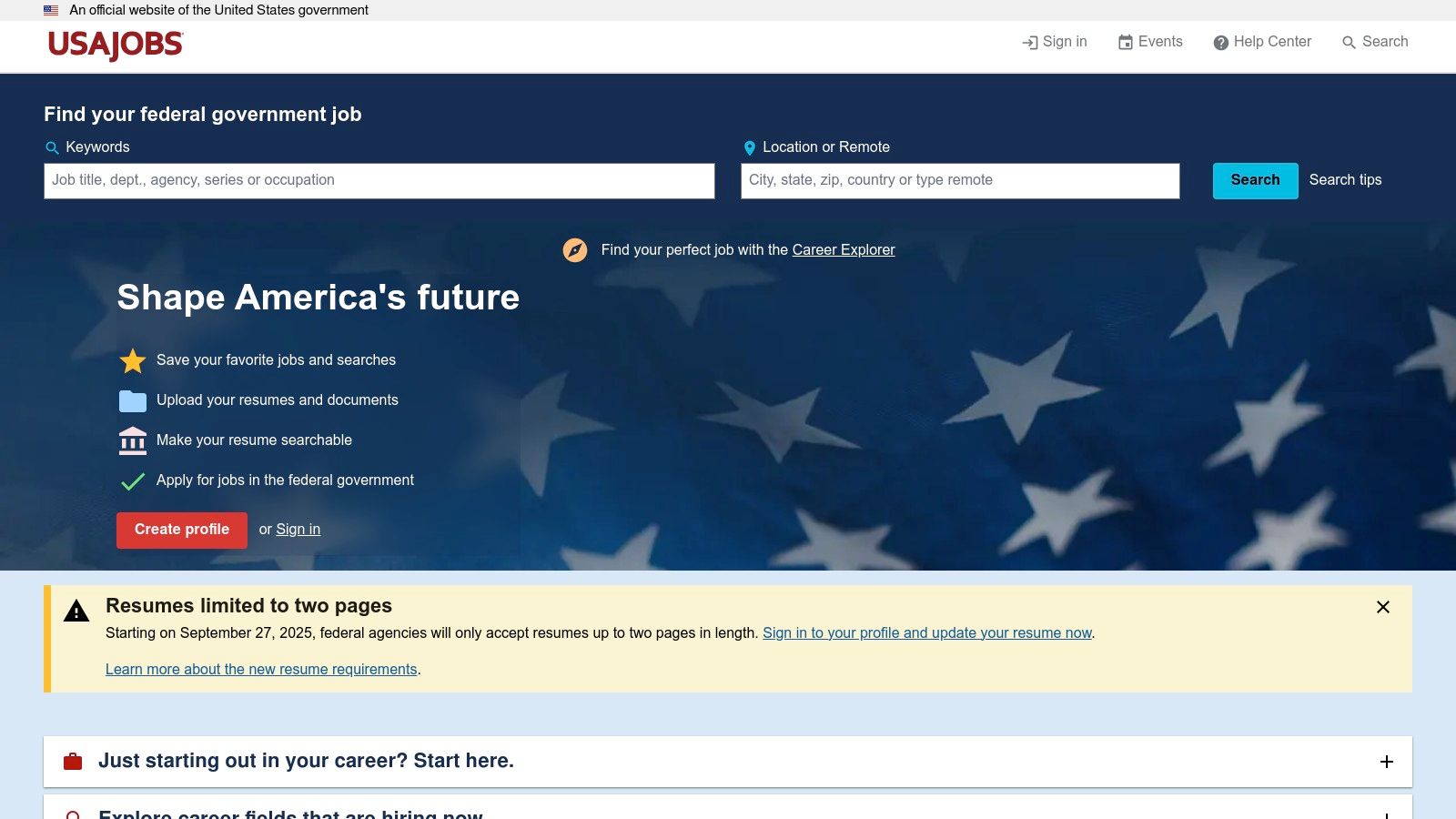
The platform centralizes what would otherwise be a chaotic hunt across dozens of individual agency websites. You create one profile, upload your documents, and apply. Sounds simple, right? Wrong. This is the government we're talking about, so expect a process that feels like it was designed by a committee in 1998.
Navigating USAJOBS is a skill in itself. The interface is clunky, and the application questionnaires are notoriously long. Here’s how to make it work for you:
USAJOBS is an essential evil. The competition is fierce, and many of the best internships are unpaid volunteer positions. But for sheer volume and access to high-profile federal legal internships in DC, no other platform comes close. It’s free to use, but the real price is your time and patience.
Website: https://www.usajobs.gov
If USAJOBS is the massive, sprawling government department store, the DOJ’s dedicated internship portal is the high-end boutique. This is where you go when you know exactly what you want: direct access to the nation’s top law enforcement and litigation powerhouse. This site is hyper-focused, listing only volunteer legal internships in DC and across the country within the DOJ's various components, like the Criminal Division, Civil Rights Division, and the National Security Division.
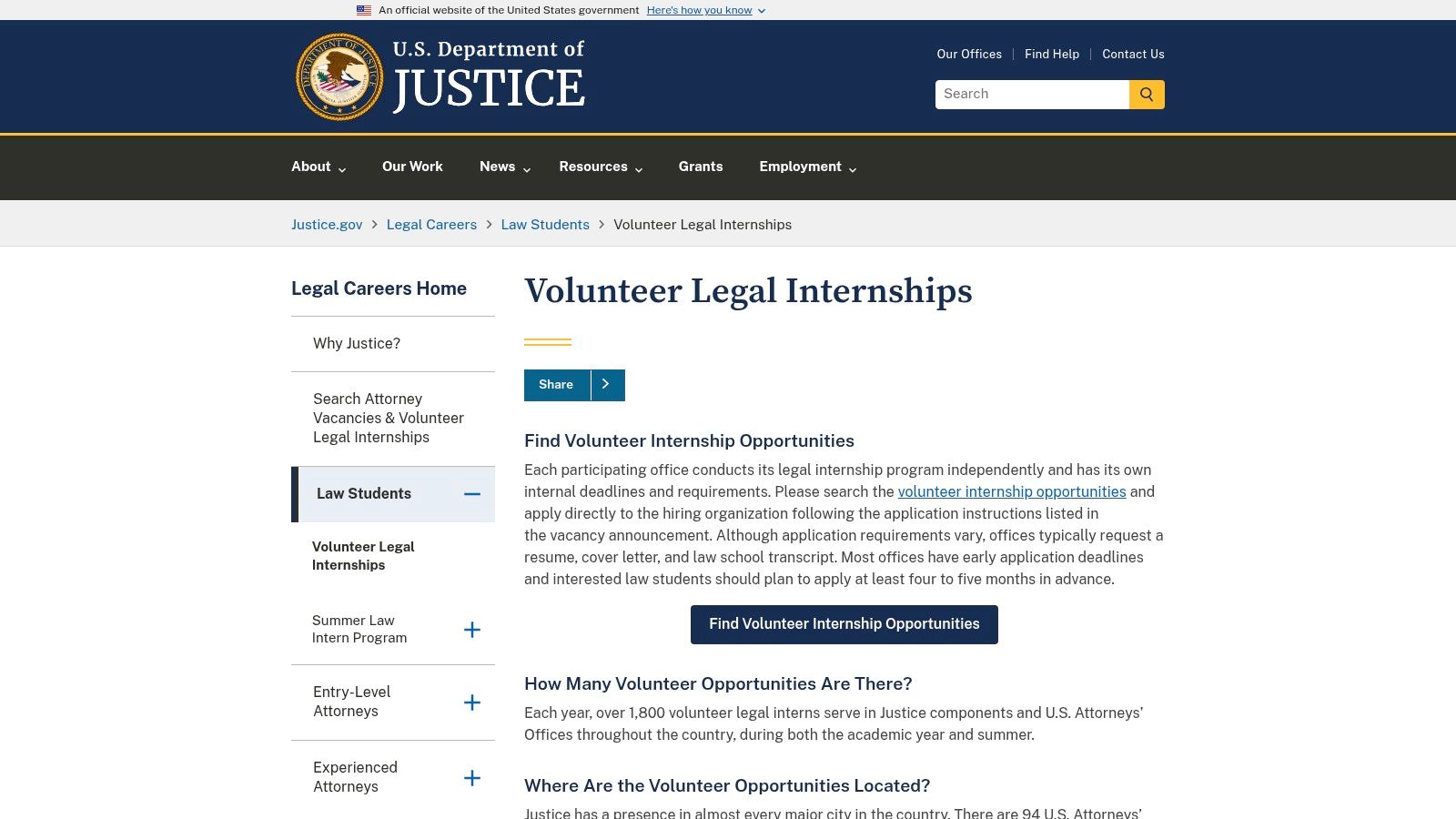
Unlike the catch-all nature of USAJOBS, this portal cuts out the noise. It’s designed specifically for law students seeking substantive legal experience. Forget navigating a labyrinthine federal system; here, you apply directly to the division that interests you, giving you a much clearer shot at your target.
The DOJ portal is more straightforward than USAJOBS, but the competition is arguably even more intense. You're up against the top students from the top schools. Here’s how to stand out:
For aspiring federal prosecutors and litigators, the DOJ’s portal is the holy grail. The internships are prestigious and offer unparalleled hands-on experience. The major catch? Nearly all are unpaid, volunteer positions. While the experience is priceless, the financial reality is a significant hurdle. If you can make it work, there is no better place to start a career in public service law.
Website: https://www.justice.gov/legal-careers/volunteer-legal-internships
If the federal bureaucracy isn't your scene, and you're driven by mission rather than a prestigious nameplate, PSJD is your sanctuary. This is the official clearinghouse for public interest law, run by the National Association for Law Placement (NALP). It’s the go-to resource for legal internships in DC at non-profits, advocacy groups, and government agencies with a public-service mission. Think ACLU, Human Rights Watch, and specialized public defender services.
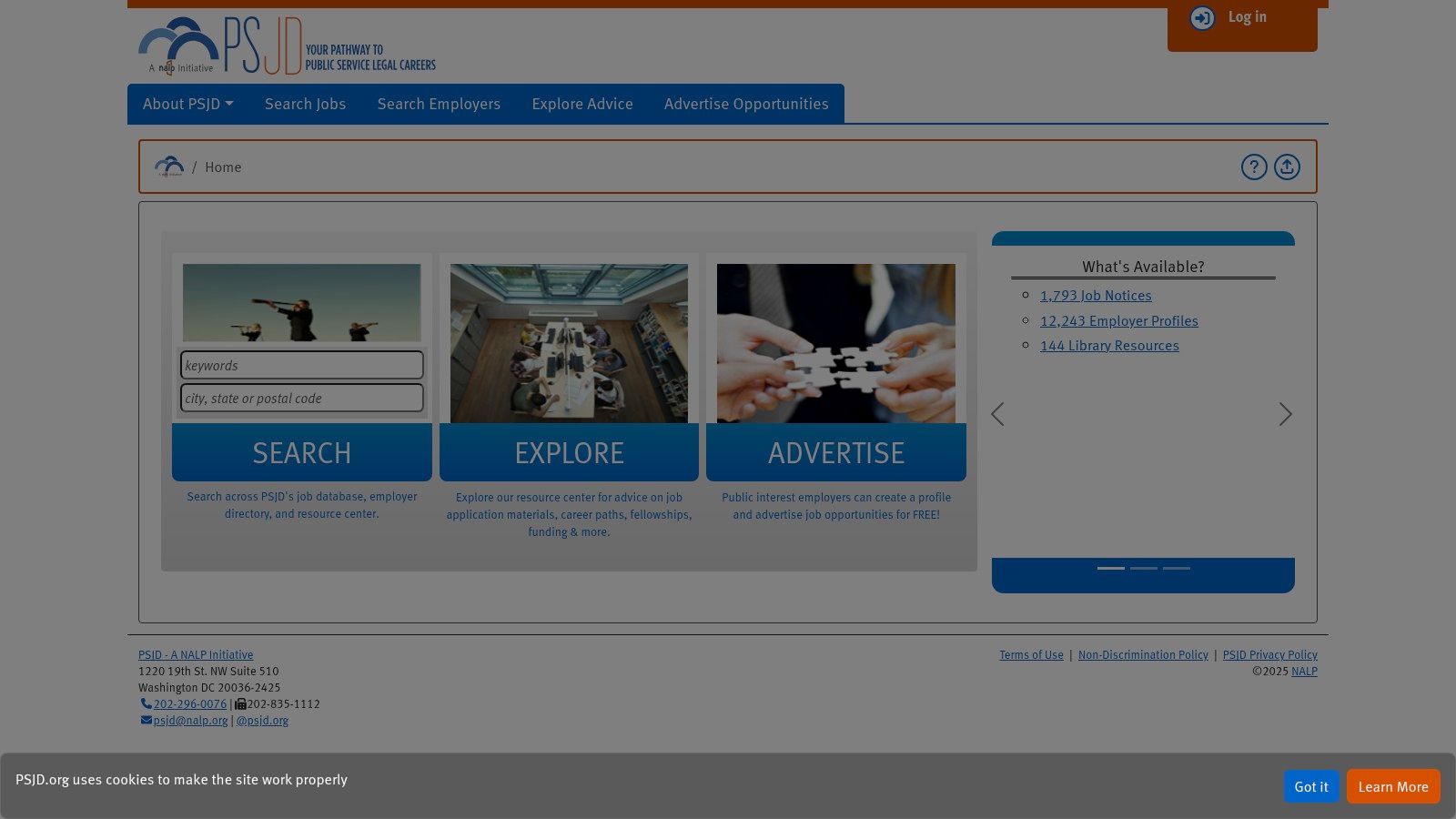
Unlike the massive, all-encompassing job boards, PSJD is highly curated. It cuts through the noise of corporate and big-law postings, connecting you directly with organizations that are genuinely trying to change the world. The platform is trusted by hundreds of law schools, so the listings are vetted and legitimate, saving you from the "is this real?" anxiety.
PSJD is more streamlined than its federal counterparts, but getting the most out of it still requires a strategy. Don't just browse; hunt with purpose.
For students passionate about public service, PSJD is an indispensable tool. It offers a focused, high-quality collection of legal internships in DC that you simply won't find consolidated anywhere else. The biggest hurdle is access; if your school isn't a subscriber, you'll have to pay. But for those dedicated to a career in public interest, it's a small price for direct access to your dream internship. Many of these roles, similar to federal positions, may offer opportunities for paralegals as well. For those interested, you can learn more about the paralegal career path.
Website: https://www.psjd.org/
If USAJOBS is the federal government’s fortress, Indeed is the sprawling, chaotic, and wonderfully comprehensive open market. This massive job aggregator casts the widest net, pulling in listings for legal internships in DC from every corner of the sector: nonprofits, small law firms, corporate legal departments, and government contractors. It’s the place you go when you want to see everything at once.
Indeed’s main advantage is its sheer volume. While other platforms specialize, Indeed simply scrapes and centralizes. This means you’ll find opportunities from major advocacy organizations and corporate giants right alongside postings from boutique litigation firms you’ve never heard of. It’s an indispensable tool for exploring the full landscape of DC’s legal scene.
The blessing of volume is also its curse. You’ll need to be a master of the filters to avoid drowning in irrelevant listings. Here’s how to cut through the noise:
Indeed is a numbers game. You will have to sift through more noise here than on more specialized platforms, and you'll encounter the occasional outdated or duplicate post. However, its massive volume and excellent search filters make it an essential tool for any law student seeking legal internships in DC. It’s completely free and provides excellent visibility into the private and nonprofit sectors that other government-focused sites miss.
Website: https://www.indeed.com
Let's talk about the rest of D.C. Beyond the government buildings, the city is a hub for powerful think tanks, advocacy groups, nonprofits, and corporate in-house teams. LinkedIn Jobs is the digital town square where these organizations post their openings for legal internships in DC. It’s less of a formal application portal and more of a dynamic professional ecosystem.
What sets LinkedIn apart is its fusion of job hunting with networking. You aren't just firing resumes into a void; you're applying within a community. You can see who works at an organization, find alumni from your law school, and even connect directly with hiring managers. This isn't just a job board; it’s a tool for strategic career intelligence.
LinkedIn rewards active, strategic users, not passive scrollers. Hope you enjoy a little professional schmoozing, because that’s the name of the game here.
LinkedIn Jobs is your best bet for the non-federal side of D.C.’s legal landscape. The platform offers unparalleled insight into the people behind the postings, turning a cold application process into a warm networking opportunity. It’s free to use, but its true value is unlocked when you invest time in building your professional network.
Website: https://www.linkedin.com/jobs
If your legal ambitions are less about corporate mergers and more about making a difference, Idealist is your platform. Forget sifting through corporate law gigs to find the one public interest role. This site is the dedicated hub for legal internships in DC with nonprofits, advocacy groups, and mission-driven organizations. Think ACLU, Human Rights Watch, or the Environmental Law Institute. It's where passion for policy and justice meets practical career opportunities.
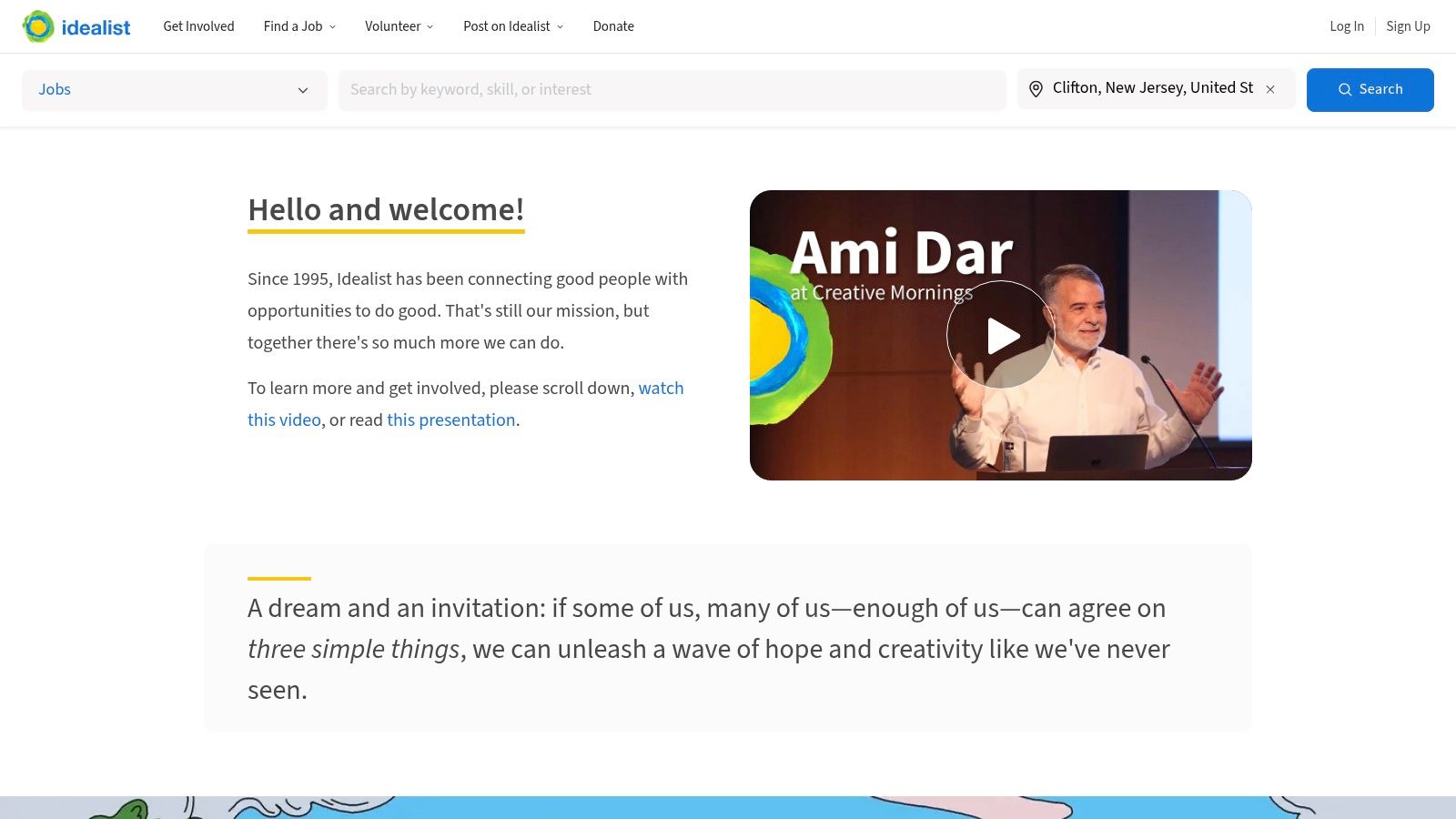
Idealist cuts through the noise of massive job boards by curating positions that serve a public good. The platform is refreshingly straightforward, providing clear, detailed descriptions that spell out duties, eligibility, and whether the internship is paid, for credit, or a volunteer position. This isn't the place you go for a six-figure summer associate salary; it's where you go to build a career with purpose.
Navigating Idealist is much simpler than government portals, but a strategic approach will set you apart from the equally passionate competition.
Idealist is the go-to resource for anyone looking to enter the public interest legal field in Washington, D.C. While it has fewer government or for-profit listings, its focus is its greatest strength. Many positions are unpaid or offer only academic credit, which is a significant barrier. However, for gaining direct experience in advocacy and nonprofit law, the value is immense. It's a direct line to the heart of D.C.'s vibrant social impact sector.
Website: https://www.idealist.org
Want a front-row seat to the local legal drama of the nation's capital? Forget the Hill for a minute and look to the courts. The DC Courts' official careers portal is your direct line to the judicial branch of Washington, DC. This isn't about federal policy; it's about the real-world application of law. This is where you find legal internships in DC that put you right in a judge's chambers or a busy court division.
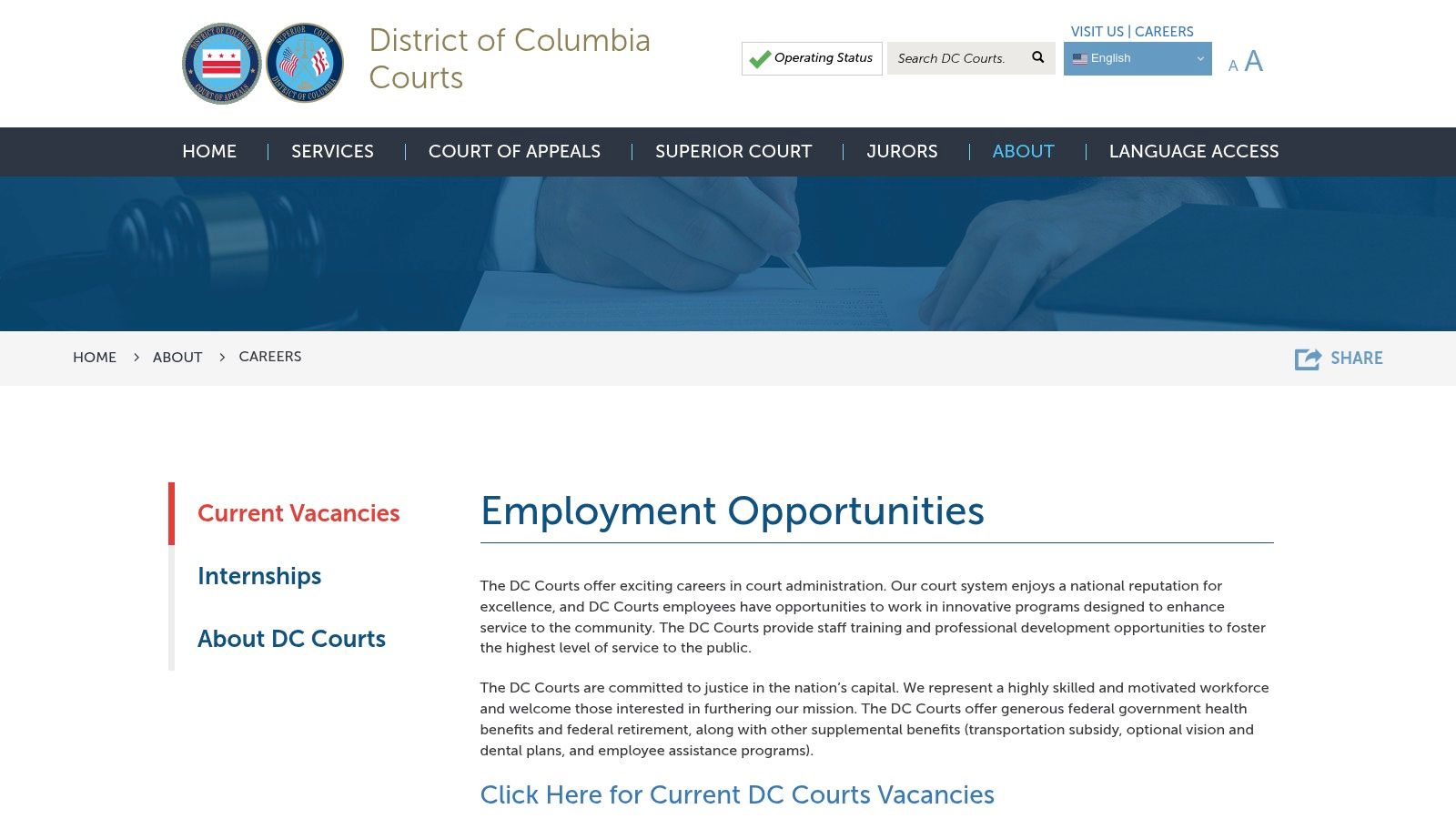
The platform isn't a massive aggregator; it's a focused gateway. It provides clear guidance on the difference between a judicial internship (working for a judge) and a divisional one (supporting a specific court office). While some of its formal listings may reroute you through USAJOBS, this site is the source of truth for understanding the unique opportunities within the DC Superior Court and Court of Appeals.
Getting a judicial internship is less about filling out forms and more about making a direct, professional appeal. Hope you've been working on your cover letter, because that’s your primary weapon here.
The DC Courts portal offers access to some of the most hands-on, legally substantive internships in the city. The downside? Most are unpaid volunteer positions, and the competition is incredibly fierce. However, the experience of drafting opinions, observing courtroom proceedings, and working alongside judges is invaluable. It’s a direct pipeline to understanding the judicial process from the inside out.
Website: https://www.dccourts.gov/about/careers
| Platform | Implementation Complexity | Resource Requirements | Expected Outcomes | Ideal Use Cases | Key Advantages |
|---|---|---|---|---|---|
| USAJOBS | Moderate; detailed questionnaires | Minimal user resources; profile setup | Federal legal internships with security clearance | Federal internships in DC | Comprehensive federal listings; standardized application; free |
| U.S. Department of Justice – Volunteer Legal Internships | Low; direct application to DOJ offices | Minimal; follow application instructions | DOJ-specific legal experience | DOJ legal internships | Direct DOJ listings; rich litigation exposure |
| PSJD (NALP’s Public-Interest Law Job Board) | Moderate; subscription may be needed | Paid subscription or law school access | Public-interest and government internships | Public-interest legal internships | Deep DC public-interest focus; extensive listings |
| Indeed | Low; easy to use aggregator | Minimal; resume upload | Broad range of DC legal internships | General legal internships in DC | Large volume; frequent updates; pay transparency |
| LinkedIn Jobs | Low to Moderate; integrated networking | Minimal; requires account | Legal internships plus networking | Networking and legal internships | Combines job search with networking; active DC listings |
| Idealist | Low; straightforward search | Minimal | Nonprofit and advocacy legal internships | Public-interest nonprofit internships | Focus on mission-driven roles; clear eligibility info |
| District of Columbia Courts – Careers and Internships | Moderate; direct judge applications | Minimal | Judicial legal internships | DC Courts internships | Direct court system access; strong legal exposure |
So there you have it. The definitive, no-fluff playbook for landing one of the coveted legal internships in DC. We’ve walked through the government behemoths, the public-interest goldmines, and the broad-net platforms. The path is laid out, but let’s be clear: knowing where to look is only half the battle.
The real trick is to stop the endless scroll and start the strategic attack. You don’t need to be on all seven platforms every day. That’s a recipe for burnout, not an offer letter. Pick the two or three channels that truly align with your five-year plan and master them.
Think of it this way: are you aiming for a future on Capitol Hill or in a non-profit boardroom? Your answer dictates your tools.
The biggest mistake is treating this like a numbers game, blasting a generic resume into the digital ether. It’s a waste of your time and an insult to the hiring manager’s intelligence. Each platform has its own language and etiquette. A LinkedIn application should be sharp and network-aware, while a PSJD cover letter should be heartfelt and mission-driven. Tailor everything.
You’ve got the map. The only thing left is to take that first step. Stop collecting bookmarks and start collecting interviews. Go build a legal career in DC that matters.
And when you’re on the other side of the desk, feeling the pain of building a top-tier legal team without mortgaging your office ping-pong table, remember this. HireParalegals offers on-demand access to elite, US-based remote paralegals who are already vetted and ready to go. Skip the hiring headaches and scale your practice intelligently at HireParalegals. (Toot, toot!)